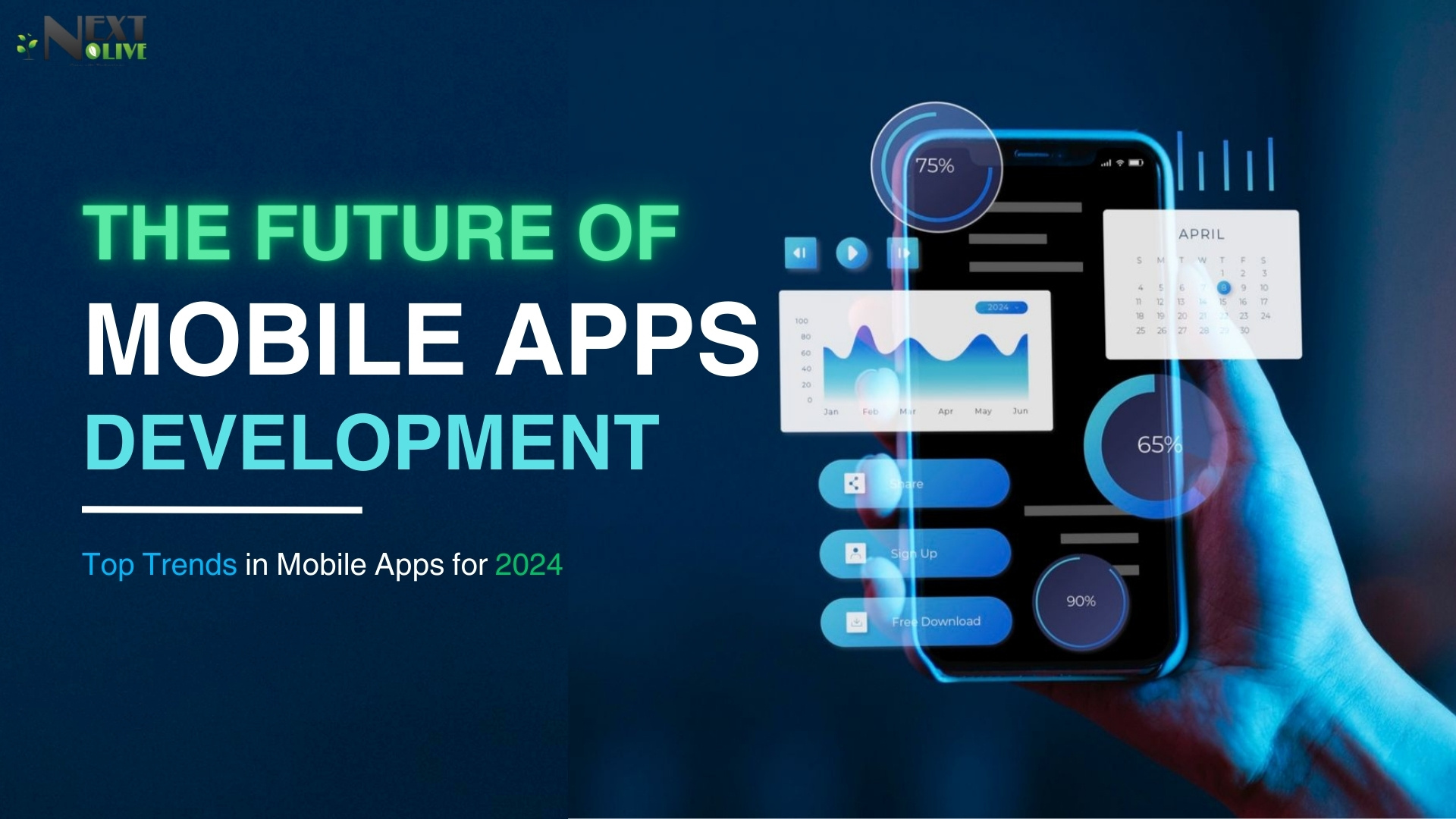The Future of Mobile Application Development: Key Trends to Watch
Mobile app development is changing, and growing faster than almost any other part of the global app market. The future trends in mobile app development are driven by Improvements in the tech stack that are remolding how businesses engage with their customers.
Table of Contents
ToggleFuture of Mobile Apps through Expert Eyes
It is not a big deal if we predict that the future of mobile apps is very shiny as we know according to Key Mobile App Statistics for 2024.
The user’s traffic on the Play Store and Apple Store is increasing by millions, if you go with stats there are approximately 700 million of which 21% of Millennials open an app 50+ times per day. On average user’s phone has more than 100 apps.
IoT in mobile apps allows businesses to leverage real-time data for better decision-making. Blockchain technology ensures secure and transparent transactions, while the impact of 5G on mobile apps is revolutionizing connectivity and speed, enabling richer and more responsive user experiences than ever before, enabling immersive XR, AR, and VR experiences that engage users like never before.
Generative AI plays a crucial role by personalizing user experiences and automating tasks, improving efficiency across various industries. Wearable technology expands the possibilities of mobile apps, incorporating health monitoring and lifestyle management seamlessly into users’ daily lives. Mobile security remains a top priority.
Mobile App Trends: How can you enroll yourself in digital presence through mobile app development?
Here, giving my gathered information on this Hot Topic.
7 Exciting Mobile App Development Trends for 2024
Foldable Technology
No code/ Low code
Artificial Intelligence
XR Extended Reality, AR Augmented Reality, VR Virtual Reality
5G technology
Cloud Computing
Blockchain Technology in Mobile Apps
Foldable Technology: With this new technology we are creating apps just for foldable devices! They’re made for folding phones, which are like a new kind of magic!
No code/ Low code: Despite traditional coding, we can adopt this no-code development, that allows even non-technical users to bring their ideas to life.
AI(Artificial intelligence): Not everyone is familiar with the role of the Canva app. With the help of the AI app Canva, we can design the latest UI without much technical interference.
XR Extended Reality, AR Augmented Reality, VR Virtual Reality: Virtual reality changes the game in medical education, providing extraordinary learning. Extended reality technology, including augmented reality (AR) and virtual reality (VR), is gaining popularity in mobile apps, especially in the form of filters and gaming experiences.
5G technology: 5G wireless technology is meant to deliver higher multi-Gbps peak data speeds.
Cloud Computing: Large clouds often have services distributed over multiple locations, that’s why one should know that cloud computing is the delivery of computing services—including servers, storage, databases, networking, software, and analytics stated by Microsoft.
Blockchain Technology in Mobile Apps: Blockchain helps entrepreneurs gain the trust of their users by ensuring safe transactions and the protection of their personal data.
Generative AI and LLM: With the 4 necessary elements: Architecture, Transformer, Tokens, Context Window, and Neural Network, LLM in Gen. AI works to enhance their capability.
Is AI in Mobile Apps in high demand?
In this era, where most people are relying on mobile phones, It is very interesting to know the Google fact “As of 2024, an estimated 4.88 billion people own a smartphone. That’s an increase of 635 million new smartphone users over the past year alone (between 2023 and 2024). The number of smartphone users worldwide grew by 2.15x since 2020”
Role of AI in comparison to AI Boon or Bane
AI in Mobile Apps as a BOON
Let’s peep into this with a real-life AI app: Nowadays Imagine using a language learning app like Duolingo that adjusts your lessons as you go, based on how you’re doing and where you need more help. The app uses AI to see how you’re learning and gives you exercises and tips that fit your needs exactly. Not only does it give lessons but it also tracks your daily activities, whether you are attending or not if not then will send you reminder mail with an action-oriented heading like” You can do this”, or Can’t you spend 5 minutes for your practice” This makes learning easier and keeps you interested and excited about reaching your language goals.
AI in Mobile Apps as a BANE
No doubt, the Integration of AI in mobile applications is magic but somehow, it is affecting our human skills. Let’s understand other famous AI ChatGPT, for example—ChatGPT an AI tool that swiftly retrieves information, making tasks easier and faster. However, this ease of access can sometimes lead to over-reliance, potentially reducing the initiative and effort people put into their work. Many bloggers and content writers, for instance, increasingly turn to AI like OpenAI for content generation, which speeds up the process but may diminish the originality and personal touch that human creativity offers. Therefore, while AI enhances efficiency, it’s important to maintain a balance that preserves and nurtures human skills alongside technological advancements.
Why choose No code development for your startups?
No-Code Development has qualities that can boost your business in the global market. Because it is not only cost-effective but also provides flexibility, Accessibility.
Cost-Effective: Hiring skilled developers can be expensive. No-code tools eliminate the need for a large development team, making app development more affordable.
Accessibility: These platforms are designed for ease of use. Entrepreneurs, small business owners, and marketers can create and manage apps without any coding knowledge.
Flexibility: No-code platforms offer a wide range of customization options. Users can easily update and modify their apps as their needs evolve.
Popular No-Code Platforms: No-code development platforms delegate users to create application software using intuitive graphical interfaces and configuration tools, instead of old shed coding methods.
- Bubble
- AppGyver
- Adalo
In conclusion, the integration of AI into mobile app development represents a paradigm shift in the industry, offering unparalleled possibilities for creating dynamic, adaptive, and user-centric applications. As the tech landscape continues to evolve, businesses and developers must embrace AI as a fundamental enabler of innovation and growth in the mobile app ecosystem.





